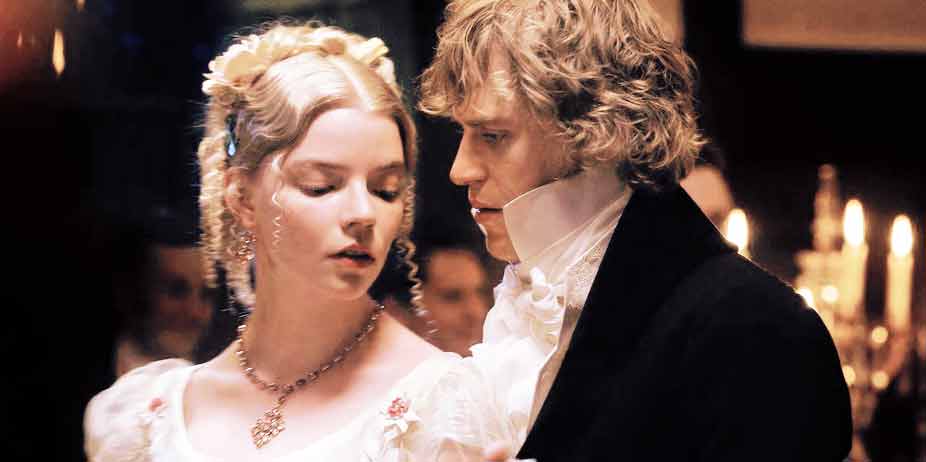
Emma. (2020)
Jane Austen's meddling heroine has returned once more to wreak havoc upon poor Harriet Smith's life, endangering her own romantic prospects in the meantime.
Emma (Anya Taylor-Joy) is quiet pleased with herself, but also a little bit sad, because her generous matchmaking skills mean that her beloved governess is about to become Mrs. Weston, and leave her for good -- a sad situation that displeases her father (Bill Nighy) mightily. But emboldened by her success, Emma decides to assist others into similar happy states. Her first target is the lovely Harriet Smith (Mia Goth), a girl of no parents and no prospects but whom is in desperate need of intervention before she marries a common farmer, a man far beneath her -- in Emma's mind, anyway.
Her friend Mr. Knightley (Johnny Flynn) regards all of this with skepticism from afar, while launching a myriad of complaints against the erstwhile and "will he ever turn up?" Frank Churchill, a beloved often-spoken icon in the town. Indeed, Emma has almost prematurely set her eye upon him before he turns up in a yellow frock coat to bring a little chaos into all their lives. If her matchmaking does not do that first, because the man she has her eye on for Harriet, much to her horror, does not care whether Harriet even exists!
Movies and television series have remade Emma a dozen times over and while none is quite altogether perfect, everyone has their favorite adaptation. This no doubt will be someone else's, but not mine. I did not like some of the peculiar choices made in its conception, among them unnecessary backside nudity, some questionable casting decisions, and the grating folk music that scraped my ears during transition scenes -- often out of nowhere, with lyrics that had nothing to do with the plot. It also suffers from lagging in the first half, followed by a rushed second half -- in the process, it neuters Frank Churchill into such a minor character, it leaves out much of his villainy. In the book and in other adaptations, the audience understands how he has "led Emma on" and been cruel to another woman; here, the most he does is entertain himself at the picnic by making Emma a spectacle. I did not like Flynn as Knightley either, in part due to the horrendous styling choices and those unattractive sideburns, but he does make Knightley an empathetic, soulful man (I preferred him as Dobbins in Vanity Fair). This Emma is indeed more unlikable than the rest, though more blunt and less cunning in her interactions. And hands down, Bill Nighy is the best Mr. Woodhouse I have ever had the pleasure to watch, stealing all of his scenes.
Probably the best addition here is Emma's atonement for her mistakes being a more active role than in all previous adaptations; I won't spoil it, but what I wanted to happen toward the end... happened. And it was marvelous. It's a visual treat of beautiful costumes, perky hair, flowing capes, and colorful carriages. Though the dancers are all out of sync (very not-period), what happens after the ball is also delightful and romantic. I walked out of the theater having had a good time, but rather unsure of my ultimate opinion of it. It's eccentric and pretty to look at, but not always delightful. Though I may not watch it again, it might just be your cup of tea.
Sexual Content
Two instances of brief backside nudity (Mr. Knightley is
shown naked from behind changing his clothes; Emma
hoists up her dress after a servant leaves the room to
warm her bum at the fire -- seen from the side; she
would have worn lots of undergarments, which would not
have made this possible in the era).
Language:
None.
Violence:
None. Emma has a nosebleed at one point.
Other:
Emma meddles in other people's lives, but does undo
the mess.
